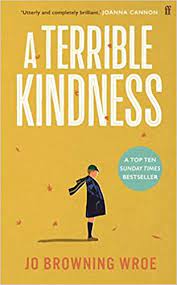Longterm blog readers will recall that pre pandemic Mr Norfolkbookworm and I often have a winter holiday around now and spend a week somewhere warmer than Norfolk. Our main activities were reading, sleeping, eating, reading, gentle exploring, and reading some more.
We're still not comfortable enough to travel as yet but I have just had a week off and I have spent a lot of it reading, and rather than reading for forthcoming projects I have spent the time revisiting old favourites as well as some good old romantic fiction.
First up was a reread of Eva Ibbotson's Journey to the River Sea and I was so pleased that it did live up to my memories. In many ways is it a very old fashioned tale, along the lines of Nesbit or Hodgson Burnett, but at the same time is as a fresh and modern as anything else being written for this age bracket. Thanks to Net Galley I have just been granted access to the official sequel, Escape to the River Sea by Emma Carroll, and I will be starting this very soon!
A new book next and Cressida McLaughlin's The Staycation. This was just what I needed after a couple of heavier reads and unlike most of Cressie's books this is a standalone novel published in one go, rather than in monthly instalments and then as a full novel which is how I've read her previous books. While the overall plot of this book was clear from the outset it was just how delightful the journey to get there was that made this such a great read. And yes the pun is intentional! My favourite part about this book was the descriptions of the British locations - I knew them all and they were spot on, I felt like I was able to follow Hester and her friends completely as they roamed London and Norfolk.
A reread and a new book made up my last two books - Rachel's Holiday and Again, Rachel by the wonderful Marian Keyes. Looking back through my reading journal I can see that I read Rachel's Holiday back in 2005, and after that all of Keyes' other books. While I could remember the general gist of the book I thought that a reread was a good idea as Again, Rachel was going to be a direct sequel (although set 20-ish years after the first book). Both were brilliant.
Reading these two books (and if I'm honest The Staycation too) reminds me of why I get so cross the way that this genre of books is dismissed as 'romantic fiction' or 'women's fiction.' The topics covered in Keyes' books don't make easy reading, although the writing makes them pure page turners, and the plotting is so tight it puts a lot of thrillers (or men's fiction) to shame. They are also funny - oh another genre that is dismissed all too often...
But as I'm typing this I can see that I have brought into this narrative. While I read quite a lot of 'women's fiction' I do tend to only review the more literary end, and the fun books like the ones mentioned I do only include in holiday round ups or under the heading 'indulgent reading.'
I think that because I don't review anything like all of the books that I read on my blog I do neglect to mention the books that are like a comfy sofa and a hot cup of tea. I need to start talking about the books that make me happy as well as the ones that make me think, that take me by surprise or that challenge me. I've never hidden the fact that I read and enjoy kidlit why don't I champion romantic/comic/women's fiction in the same way?
I'm too late for a New Year's resolution (and even a Chinese New Year's resolution) but I will try to do better.




